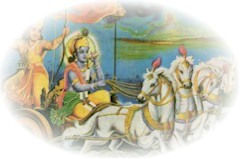| GITA
JAYANTI |
|
| Celebration :
The Birth of Bhagwad Gita |
|
| Known for :
The Sacred Scripture |
|
| Religion :
Hindu |
|
| In the month
of :
December - January |
|
|
|
| THE GITA Jayanthi or the
birthday of the Bhagavad-Gita is celebrated throughout India by all admirers
and lovers of this sacred scripture on the 11th day (Ekadashi) of the bright
half of the month of Margaseersha (December-January) according to the Hindu
almanac. That was the day on which Sanjaya narrated the dialogue between Sri
Krishna and Arjuna, to King Dhritarashtra, and thus made the glorious teachings
of the Lord available to us, to all the people of the world, and for all time. |
|
| The Gita Jayanthi marks one of the greatest
days in the history of mankind. Nearly six thousand years ago on that day a
dazzling flash of brilliant lightning lit up the firmament of human
civilization. That spiritual effulgence, that flash, was the message of the
Bhagavad Gita, given by the Lord Himself on the battlefield of Kurukshetra.
Unlike ordinary dashes of lightning which die away after dashing for 'a
split-second, this brilliant dash of that memorable day continued to shine
through the centuries and even now illumines the path of humanity on its onward
march to perfection.
|
 |
|
|
| The Gita is the most beautiful and only truly
philosophical song. It contains sublime lessons on wisdom and philosophy. It is
the "Song Celestial'. It is the universal gospel. It contains the message of
life that appeals to all, irrespective of race, creed, age or religion.
|
|
| The Gita was given to us about six thousand
years ago through Arjuna, an Indian prince, by Sri Krishna, the Lord incarnate.
The teachings are based on the Upanishads, the ancient, revealed metaphysical
classics of India. The Gita shows a way to rise above the world of duality and
the pairs of opposites and to attain eternal bliss and immortality. It is a
gospel of action. It teaches the rigid performance of one's duty in society,
the life of active struggle, keeping one's inner being untouched by outer
surroundings and renouncing all fruits of actions as offerings unto the Lord.
|
|
 |
The Gita is a source of power
and wisdom. It strengthens you when you are weak and inspires you when you are
feeble. It teaches you to embrace righteousness and resist unrighteousness.
The Gita is not merely a book; it is not a mere scripture. It is a living voice
carrying an eternally vital and indispensable message to mankind. Its verses
embody words of wisdom, coming from the infinite ocean of knowledge, the
Absolute Itself. |
|
|
| The voice of the Gita is the call of the
Supreme. It is the divine sound explained. The mightiest primal source of all
existence, all power, is the manifested sound, Om. This is the divine Word. It
is the Nada Brahman whose unceasing can is: "Be ye all ever merged in the
eternal unbroken continuous consciousness of the Supreme Truth". This is the
sublime message that the great Gita elaborates and presents in all
comprehensiveness and in a universally accepted form. It is verily this message
of the Bhagavad Gita that I wish to recall and reproclaim with emphasis to you.
|
|
| To be always conscious of the Divine, to ever
feel the Divine presence, to live always in the awareness of the Supreme Being
in the chambers of your heart and everywhere around you, is verily to live a
life of fullness and divine perfection on earth itself Such constant
remembrance of God and such attitude of mind will release you forever from the
clutches of Maya and free you from all fear To forget the Supreme is to fall
into Maya. To forget Him is to be assailed by fear To live in unbroken
remembrance of the Supreme Truth is to remain always in the region of Light,
far beyond Maya's reach.
|
|
| Mark carefully how the Gita again and again
stresses upon this lofty message. The Lord declares : "Keep thou thy mind in
Me, in Me place thy reason". |
|
| In another verse, He says "Therefore, at all
times remember Me and fight You will surely attain Me, thus having offered
yourself'.
|
|
| And yet again: "perform action remaining
united with Me at heart". |
|
|
|
|
|